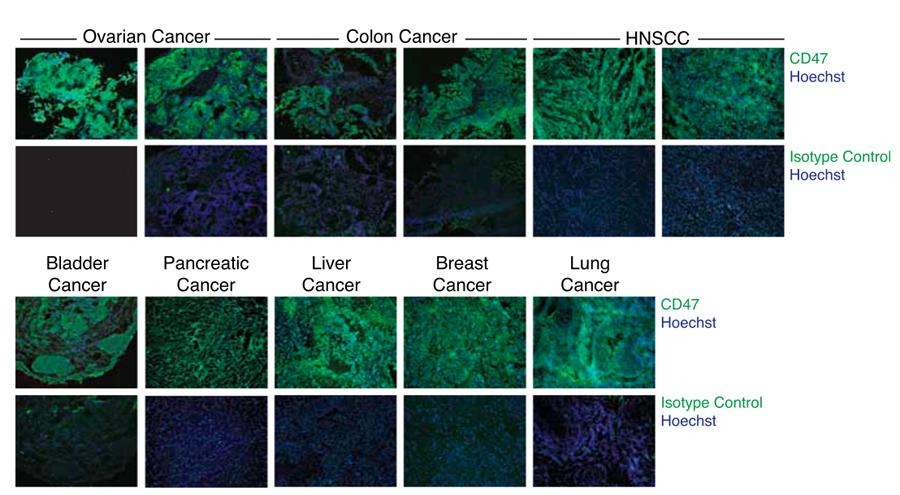One drug to shrink all tumors
March 27, 2012 | Source: Science Now

Immunofluorescence analyses were performed on sections prepared from fresh-frozen patient solid tumors. CD47 was highly expressed by human patient ovarian, breast, bladder, colon, liver, pancreatic, lung, and head and neck squamous cell carcinoma (HNSCC) tumors, with elevated levels of expression on tumor cells compared with the surrounding stroma. (Credit: Stephen B. Willingham et al./PNAS)
Stanford researchers have found a single drug that can shrink or cure human breast, ovary, colon, bladder, brain, liver, and prostate tumors that have been transplanted into mice.
The treatment, an antibody that blocks a “do not eat” signal normally displayed on tumor cells, coaxes the immune system to destroy the cancer cells.
A decade ago, biologist Irving Weissman of the Stanford University School of Medicine discovered that leukemia cells produce higher levels of a protein called CD47 than do healthy cells. CD47, he and other scientists found, is also displayed on healthy blood cells; it’s a marker that blocks the immune system from destroying healthy cells as they circulate. Cancers take advantage of this flag to trick the immune system into ignoring them.
In the past few years, Weissman’s lab showed that blocking CD47 with an antibody cured some cases of lymphomas and leukemias in mice by stimulating the immune system to recognize the cancer cells as invaders. Now, he and colleagues have shown that the CD47-blocking antibody may have a far wider impact than just blood cancers.
“It’s on every single human primary tumor that we testet,” said says Weissman. Moreover, Weissman’s lab found that cancer cells always had higher levels of CD47 than did healthy cells. How much CD47 a tumor made could predict the survival odds of a patient.
“We showed that even after the tumor has taken hold, the antibody can either cure the tumor or slow its growth and prevent metastasis,” says Weissman.
Weissman’s team has received a $20 million grant from the California Institute for Regenerative Medicine to move the findings from mouse studies to human safety tests.
Ref.: Stephen B. Willingham et al., The CD47-signal regulatory protein alpha (SIRPa) interaction is a therapeutic target for human solid tumors, PNAS, 2012 [DOI: 10.1073/pnas.1121623109] (open access)
